牛津译林版七年级下册 Unit 8 Pets Grammar课件(共23张PPT)
文档属性
| 名称 | 牛津译林版七年级下册 Unit 8 Pets Grammar课件(共23张PPT) | 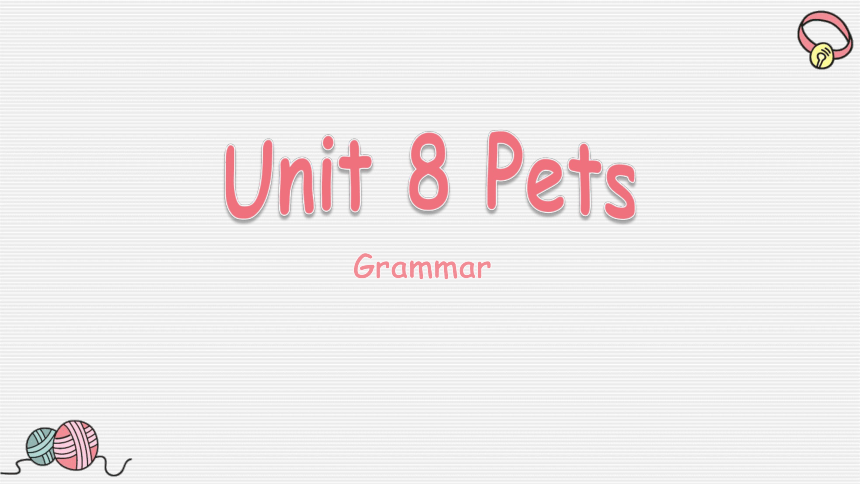 | |
| 格式 | pptx | ||
| 文件大小 | 1.1MB | ||
| 资源类型 | 教案 | ||
| 版本资源 | 牛津译林版 | ||
| 科目 | 英语 | ||
| 更新时间 | 2023-06-07 15:04:59 | ||
图片预览

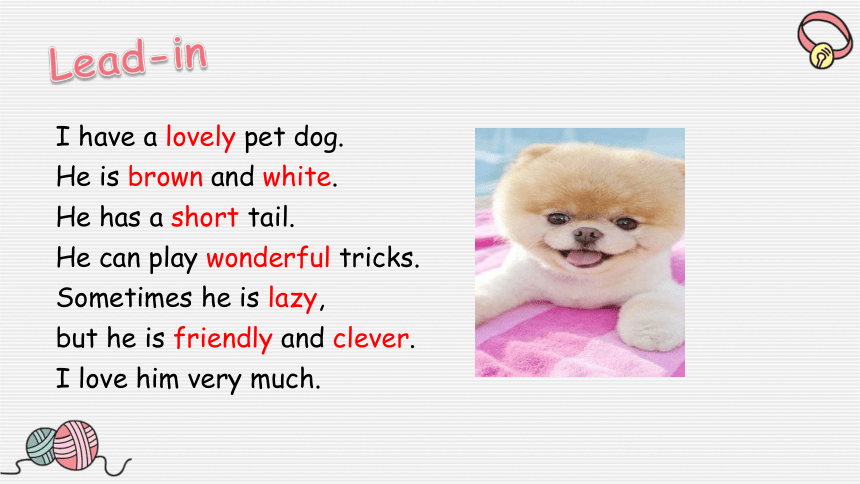
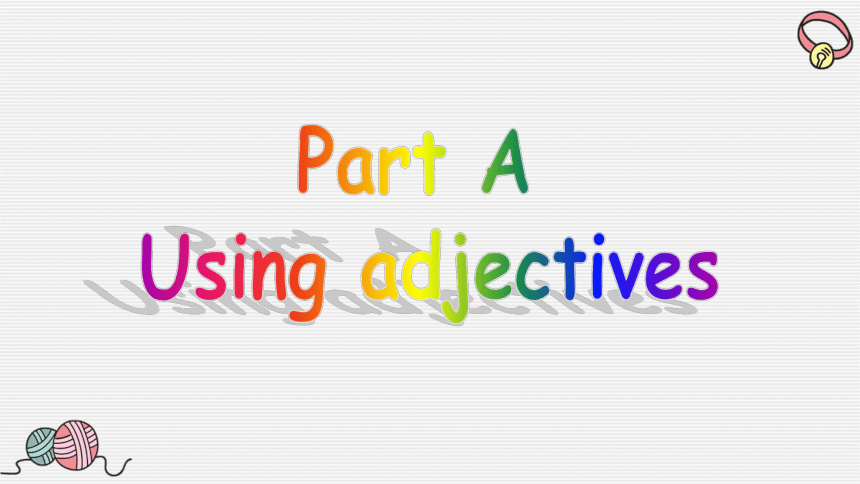


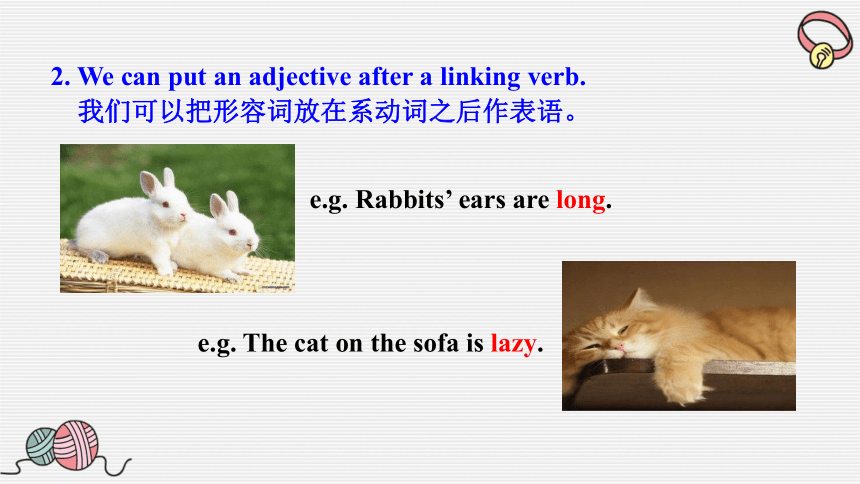
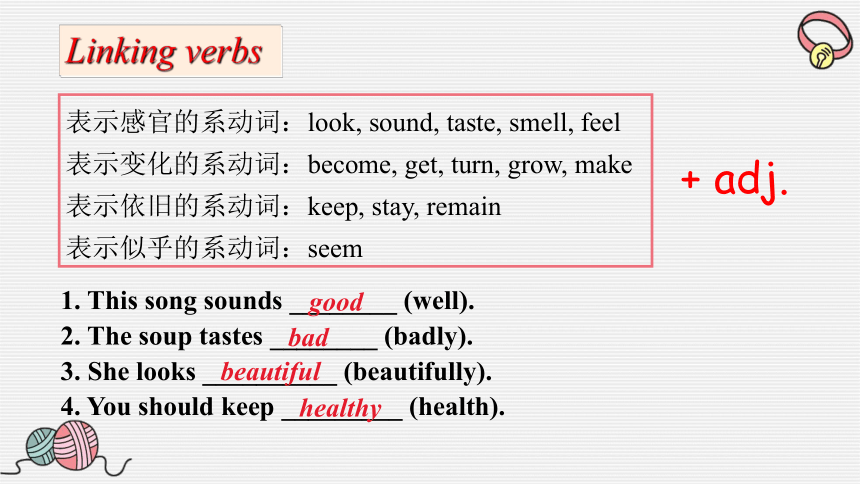

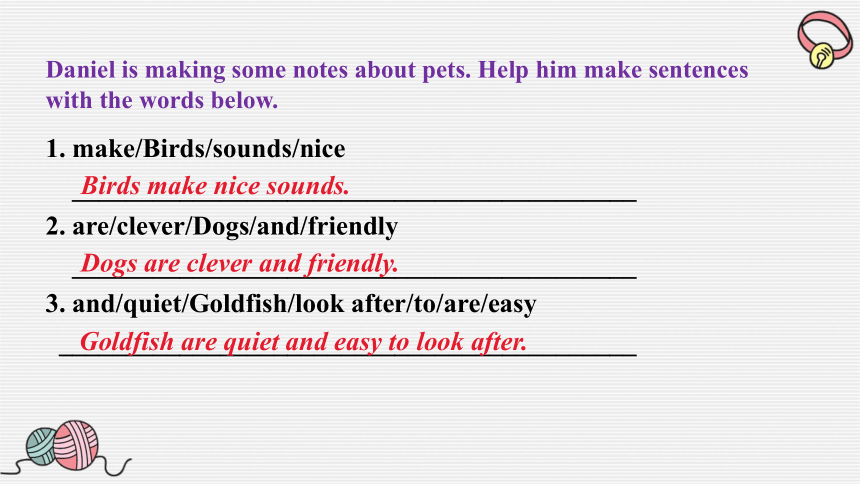
文档简介
(共23张PPT)
Grammar
Unit 8 Pets
Lead-in
I have a lovely pet dog.
He is brown and white.
He has a short tail.
He can play wonderful tricks.
Sometimes he is lazy,
but he is friendly and clever.
I love him very much.
Part A
Using adjectives
What are adjectives
We use adjectives to describe people or things.
1. She is ____ (高的) and ____ (苗条的).
2. Li Hua is my __________ (特别喜爱的) football star.
3. The classrooms are ______ (干净的) and ______ (明亮的).
4. We always have a _____ (愉快的) time at school.
5. It is __________ (极好的).
6. Sometimes, I feel _______ (饿的) between meals, so I eat an apple or a pear.
7. Yes, they’re very _______ (漂亮的).
tall
slim
favourite
clean
bright
good
wonderful
hungry
pretty
How to use adjectives
1. We can put an adjective before a noun.
我们可以把形容词放在名词之前作定语。
e.g. Rabbits have long ears.
e.g. A lazy cat is sleeping on the sofa.
2. We can put an adjective after a linking verb.
我们可以把形容词放在系动词之后作表语。
e.g. Rabbits’ ears are long.
e.g. The cat on the sofa is lazy.
Linking verbs
表示感官的系动词:look, sound, taste, smell, feel
表示变化的系动词:become, get, turn, grow, make
表示依旧的系动词:keep, stay, remain
表示似乎的系动词:seem
+ adj.
1. This song sounds ________ (well).
2. The soup tastes ________ (badly).
3. She looks __________ (beautifully).
4. You should keep _________ (health).
good
bad
beautiful
healthy
3. We can put an adjective phrase after a noun as an attributive.
我们可以把形容词短语放在名词之后作后置定语。
e.g. I want to buy some presents different from Amy’s.
I don’t want to take the bus full of people.
4. We can use an adjective as an object complement.
我们可以用形容词作宾语补足语。
e.g. You keep the classroom clean.
Leave me alone, please.
Daniel is making some notes about pets. Help him make sentences with the words below.
1. make/Birds/sounds/nice
__________________________________________
2. are/clever/Dogs/and/friendly
__________________________________________
3. and/quiet/Goldfish/look after/to/are/easy
___________________________________________
Birds make nice sounds.
Dogs are clever and friendly.
Goldfish are quiet and easy to look after.
Daniel found two passages about pets on the plete the sentences with the words in the box.
black
tired
hungry
special
clever
happy
Part B
Indefinite pronouns
What are indefinite pronouns
We use indefinite pronouns to refer to people and things when we do not know or do not need to mention who or what we are talking about. 当我们不知道或没有必要说明所谈论的人是谁或是什么事物时,我们就用不定代词来指代人或物。
How to form indefinite pronouns
复合不定代词是由some-, any-, no-, every-加上-one, -body, -thing所组成的不定代词。复合不定代词包括:
指人:somebody、someone 某人,有人
anybody、anyone 任何人
everybody、everyone 每个人,人人
nobody、no one 没有人
指物:something 某物,某事
anything 任何事物
everything 每件事物,一切
nothing 没有东西,没有事情
How to use indefinite pronouns
1. somebody, someone, something通常用于肯定句中
e.g. I saw somebody/someone/something in the house.
2. somebody, someone, something还可以用于表示请求、建议等委婉语气的疑问句中,或者期望得到对方肯定答复的疑问句中
e.g. Will somebody/someone come to help me
Would you like something to eat
3. anybody, anyone, anything通常用于否定句或者疑问句中
e.g. I did not see anybody/anyone/anything in the house.
Did you see anybody/anyone/anything in the house
4. anybody, anyone, anything还可以用于肯定句中,表示“任何人,任何事”
e.g. Anybody/Anyone knows the answer.
Anything is OK.
5. nobody, no one, nothing用于指代“没有人,没有东西”
e.g. There is nobody/no one/nothing in the house.
6. everybody, everyone, everything用于指代“每个人,一切”
e.g. Is everybody/everyone here today
Everything is ready.
Other rules
1. 形容词修饰不定代词时,通常要位于不定代词的后面。
e.g. Is there anything important in today’s newspaper
2. 不定代词作主语时,谓语动词通常用单数形式。
e.g. Everything is ready.
Everybody likes to join in this activity.
3. “not every-”表示的是部分否定,意为“并非都,不都”。
e.g. Not everything will go well.
4. “not any-”可以和“no-”进行转换。
e.g. I did not hear anything. = I heard nothing.
Mr Wu is asking the students about their plete their conversation with the correct indefinite pronouns.
anything
anybody/anyone
everybody/everyone
somebody/someone
anybody/anyone
Nobody/No one
nothing
Useful phrases and expressions
1. a special friend of mine 我的一位特殊的朋友
2. repeat my words 重复我的话
3. say hello to sb. 向某人问好
4. come back home 回家
5. all the time 一直
6. be nice/kind to sb. 对某人友好的
Exercises
1. All the students are talking and laughing and it’s ______.
A. noisy B. lonely C. quiet D. strict
2. Tom is very ______. He never cleans his room.
A. lazy B. active C. smart D. healthy
3. Mrs. Brown is nice. Every day she tried to cook __________ for me during my stay in Canada.
A. something different B. anything different
C. different something D. different anything
4. I think ______ can make Andy change his mind. He is such a person who never gives up easily.
A. something B. anything C. nothing D. everything
5. ---Is _________ here
---No, Bob and Tim have asked for leave.
A. anybody B. somebody C. everybody D. nobody
6. John has three sisters. Mary is the _______ of the three.
A. most cleverest B. more clever
C. cleverest D. cleverer
7. These oranges taste ____.
A. good B. well C. to be good D. to be well
8. ---What else do you need for your trip
---______ else. Everything is ready.
A. Something B. Everything C. Nothing D. Anything
1. Someone _______ (want) to see you at the school gate.
2. There ____ (be) nothing wrong with the car.
3. How is __________ (一切) going
4. Mother will buy me _________ ____ (好吃的东西) this afternoon.
5. Goldfish are _____ _____ ______ ______ (容易照顾).
6. _____ _________ (并非所有人) will go to the park tomorrow.
7. Uncle Xiao didn’t say anything at the meeting.
= Uncle Xiao ______ ________ at the meeting.
8. She ate nothing in the morning.
= She ______ _____ ________ in the morning.
wants
is
everything
something nice
easy to look after
Not everybody
said nothing
didn’t eat anything
Thank you!
Grammar
Unit 8 Pets
Lead-in
I have a lovely pet dog.
He is brown and white.
He has a short tail.
He can play wonderful tricks.
Sometimes he is lazy,
but he is friendly and clever.
I love him very much.
Part A
Using adjectives
What are adjectives
We use adjectives to describe people or things.
1. She is ____ (高的) and ____ (苗条的).
2. Li Hua is my __________ (特别喜爱的) football star.
3. The classrooms are ______ (干净的) and ______ (明亮的).
4. We always have a _____ (愉快的) time at school.
5. It is __________ (极好的).
6. Sometimes, I feel _______ (饿的) between meals, so I eat an apple or a pear.
7. Yes, they’re very _______ (漂亮的).
tall
slim
favourite
clean
bright
good
wonderful
hungry
pretty
How to use adjectives
1. We can put an adjective before a noun.
我们可以把形容词放在名词之前作定语。
e.g. Rabbits have long ears.
e.g. A lazy cat is sleeping on the sofa.
2. We can put an adjective after a linking verb.
我们可以把形容词放在系动词之后作表语。
e.g. Rabbits’ ears are long.
e.g. The cat on the sofa is lazy.
Linking verbs
表示感官的系动词:look, sound, taste, smell, feel
表示变化的系动词:become, get, turn, grow, make
表示依旧的系动词:keep, stay, remain
表示似乎的系动词:seem
+ adj.
1. This song sounds ________ (well).
2. The soup tastes ________ (badly).
3. She looks __________ (beautifully).
4. You should keep _________ (health).
good
bad
beautiful
healthy
3. We can put an adjective phrase after a noun as an attributive.
我们可以把形容词短语放在名词之后作后置定语。
e.g. I want to buy some presents different from Amy’s.
I don’t want to take the bus full of people.
4. We can use an adjective as an object complement.
我们可以用形容词作宾语补足语。
e.g. You keep the classroom clean.
Leave me alone, please.
Daniel is making some notes about pets. Help him make sentences with the words below.
1. make/Birds/sounds/nice
__________________________________________
2. are/clever/Dogs/and/friendly
__________________________________________
3. and/quiet/Goldfish/look after/to/are/easy
___________________________________________
Birds make nice sounds.
Dogs are clever and friendly.
Goldfish are quiet and easy to look after.
Daniel found two passages about pets on the plete the sentences with the words in the box.
black
tired
hungry
special
clever
happy
Part B
Indefinite pronouns
What are indefinite pronouns
We use indefinite pronouns to refer to people and things when we do not know or do not need to mention who or what we are talking about. 当我们不知道或没有必要说明所谈论的人是谁或是什么事物时,我们就用不定代词来指代人或物。
How to form indefinite pronouns
复合不定代词是由some-, any-, no-, every-加上-one, -body, -thing所组成的不定代词。复合不定代词包括:
指人:somebody、someone 某人,有人
anybody、anyone 任何人
everybody、everyone 每个人,人人
nobody、no one 没有人
指物:something 某物,某事
anything 任何事物
everything 每件事物,一切
nothing 没有东西,没有事情
How to use indefinite pronouns
1. somebody, someone, something通常用于肯定句中
e.g. I saw somebody/someone/something in the house.
2. somebody, someone, something还可以用于表示请求、建议等委婉语气的疑问句中,或者期望得到对方肯定答复的疑问句中
e.g. Will somebody/someone come to help me
Would you like something to eat
3. anybody, anyone, anything通常用于否定句或者疑问句中
e.g. I did not see anybody/anyone/anything in the house.
Did you see anybody/anyone/anything in the house
4. anybody, anyone, anything还可以用于肯定句中,表示“任何人,任何事”
e.g. Anybody/Anyone knows the answer.
Anything is OK.
5. nobody, no one, nothing用于指代“没有人,没有东西”
e.g. There is nobody/no one/nothing in the house.
6. everybody, everyone, everything用于指代“每个人,一切”
e.g. Is everybody/everyone here today
Everything is ready.
Other rules
1. 形容词修饰不定代词时,通常要位于不定代词的后面。
e.g. Is there anything important in today’s newspaper
2. 不定代词作主语时,谓语动词通常用单数形式。
e.g. Everything is ready.
Everybody likes to join in this activity.
3. “not every-”表示的是部分否定,意为“并非都,不都”。
e.g. Not everything will go well.
4. “not any-”可以和“no-”进行转换。
e.g. I did not hear anything. = I heard nothing.
Mr Wu is asking the students about their plete their conversation with the correct indefinite pronouns.
anything
anybody/anyone
everybody/everyone
somebody/someone
anybody/anyone
Nobody/No one
nothing
Useful phrases and expressions
1. a special friend of mine 我的一位特殊的朋友
2. repeat my words 重复我的话
3. say hello to sb. 向某人问好
4. come back home 回家
5. all the time 一直
6. be nice/kind to sb. 对某人友好的
Exercises
1. All the students are talking and laughing and it’s ______.
A. noisy B. lonely C. quiet D. strict
2. Tom is very ______. He never cleans his room.
A. lazy B. active C. smart D. healthy
3. Mrs. Brown is nice. Every day she tried to cook __________ for me during my stay in Canada.
A. something different B. anything different
C. different something D. different anything
4. I think ______ can make Andy change his mind. He is such a person who never gives up easily.
A. something B. anything C. nothing D. everything
5. ---Is _________ here
---No, Bob and Tim have asked for leave.
A. anybody B. somebody C. everybody D. nobody
6. John has three sisters. Mary is the _______ of the three.
A. most cleverest B. more clever
C. cleverest D. cleverer
7. These oranges taste ____.
A. good B. well C. to be good D. to be well
8. ---What else do you need for your trip
---______ else. Everything is ready.
A. Something B. Everything C. Nothing D. Anything
1. Someone _______ (want) to see you at the school gate.
2. There ____ (be) nothing wrong with the car.
3. How is __________ (一切) going
4. Mother will buy me _________ ____ (好吃的东西) this afternoon.
5. Goldfish are _____ _____ ______ ______ (容易照顾).
6. _____ _________ (并非所有人) will go to the park tomorrow.
7. Uncle Xiao didn’t say anything at the meeting.
= Uncle Xiao ______ ________ at the meeting.
8. She ate nothing in the morning.
= She ______ _____ ________ in the morning.
wants
is
everything
something nice
easy to look after
Not everybody
said nothing
didn’t eat anything
Thank you!
